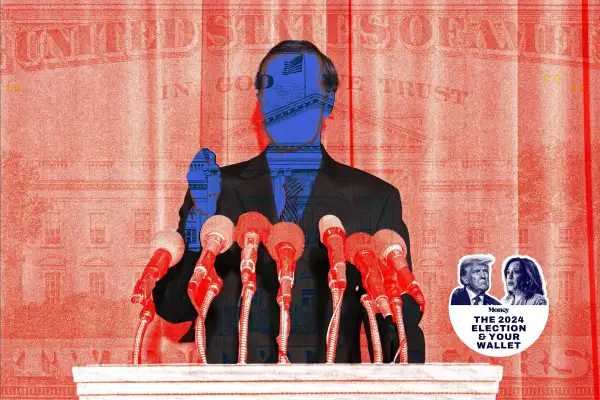Why Kamala Harris and Donald Trump Keep Sending You Texts Asking for Tiny Donations

Within six hours of President Joe Biden's decision to drop out of the 2024 race this past Sunday, Vice President Kamala Harris was in Americans' inboxes asking for $20.
It's not unusual. Amid an unprecedented few weeks in U.S. politics, the Republican and Democratic parties — and their respective candidates — have proven relentless in soliciting political contributions. Voters have received a flood of emails and text messages desperately asking “will you pitch in your first $20 today to elect me as president?” (Harris) or saying “I need you to do me a personal favor by chipping in” (former President Donald Trump).
But they’re not demanding huge contributions. Though the tone is exaggerated, the actual request is usually small, with the candidates begging for $2, $7 or another seemingly insignificant amount. So what's the deal?
Jennifer Heerwig, a political sociologist at Stony Brook University, says the biggest reason for these missives is an obvious one: Elections are expensive. In 2020, presidential candidates, congressional candidates, the parties and groups supporting them spent $14.4 billion. About $5.7 billion of that was spent on the presidential race alone.
Simply put, “candidates need money to run a viable campaign,” Heerwig says.
Donations are especially important for candidates who haven't run for office before because they need to spend money simply to get on the radar of voters.
Early in a campaign, raising a lot of money can be a way to show the general public (and bigger donors) that a candidate has a fighting chance. And while it’s not an automatic W, typically, the more a challenger spends, the more likely they are to emerge victorious.
“The campaigns use that money coming from donations for all sorts of things we don’t see,” Heerwig adds. “Beyond direct interactions with voters, campaigns are using money to pay campaign staff, to do — maybe, depending on the candidate — some polling, host events, all of these things that happen behind the scenes.”
These aren't static expenditures, either: NPR reported in November that it costs money to remain agile, expanding to new apps or micro-targeting certain demographics on the fly.
Why political candidates love small donations
Small-dollar donations are particularly coveted because they can telegraph grassroots support. Grassroots support, in turn, can indicate that a candidate is in touch with everyday people.
This is something politicians love to tout. After announcing her campaign in 2019, Elizabeth Warren boasted that her average donation was $28. Last year, the New York Times reported that 668,000 donors gave less than $200 to Trump, now the 2024 Republican nominee. And after Biden endorsed Harris to replace him as the Democratic nominee on Sunday, ActBlue — a left-leaning fundraising website — excitedly confirmed it had raised over $27.5 million from small-dollar donors in five hours.
“Every little bit helps, from the candidates’ perspective, even at the presidential level,” says Conor Dowling, a political science professor at the University at Buffalo. “Those individual contributions signal that they have support from people — and it's not just a few millionaires and billionaires.”
Size aside, another major reason campaigns solicit donations is to collect data. Heerwig says that once a voter makes their first contribution, they become part of the donor list, which can be shared with other candidates and the party, giving them direct access to a highly politically engaged audience.
Remember the fervor over Bernie Sanders’ 2016 email database? There’s a reason Politico called it his “secret weapon.”
Once someone donates, “that person can be targeted with get-out-the-vote communications or [become] a volunteer, somebody who is engaging with the campaign in a different way,” says Shanna Ports, senior legal counsel in campaign finance at the nonpartisan Campaign Legal Center. “They can become an active participant in the campaign.”
They can also, crucially, be asked for further donations. And all those small donations add up to big numbers that make headlines.
“[Campaigns] know that number is going to be splashed around in the press, and it becomes a metric of their likelihood of success,” Ports says. “If they can get a lot of $2 donations, that might put them over the edge to that number they're targeting.”
On a practical level, Dowling says emails and texts like the ones you're getting are relatively quick and inexpensive for campaigns to send. The lift is low, and the payoff is potentially great. Some back-of-the-envelope math: If a message goes out to 500,000 people, and a fourth of them feel moved to donate $2, that’s $250,000 more in the bank.
No candidate is going to turn their nose up at a quarter of a million bucks.
“They can find a use for money if they have it,” Dowling says.
More from Money:
Trump and Biden on Inflation, Taxes and Social Security: Who Told the Truth at the First Debate?
How Can I Make the Most Impact with My (Kinda Small) Charitable Donation?
Americans Think Inflation Will Get Worse After the Election. Should We Be Worried?

